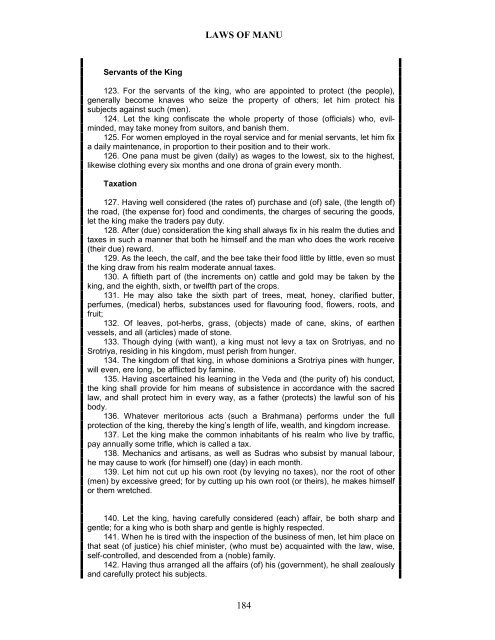Create successful ePaper yourself
Turn your PDF publications into a flip-book with our unique Google optimized e-Paper software.
LAWS OF MANU<br />
Servants of the King<br />
123. For the servants of the king, who are appointed to protect (the people),<br />
generally become knaves who seize the property of others; let him protect his<br />
subjects against such (men).<br />
124. Let the king confiscate the whole property of those (officials) who, evilminded,<br />
may take money from suitors, and banish them.<br />
125. For women employed in the royal service and for menial servants, let him fix<br />
a daily maintenance, in proportion to their position and to their work.<br />
126. One pana must be given (daily) as wages to the lowest, six to the highest,<br />
likewise clothing every six months and one drona of grain every month.<br />
Taxation<br />
127. Having well considered (the rates of) purchase and (of) sale, (the length of)<br />
the road, (the expense for) food and condiments, the charges of securing the goods,<br />
let the king make the traders pay duty.<br />
128. After (due) consideration the king shall always fix in his realm the duties and<br />
taxes in such a manner that both he himself and the man who does the work receive<br />
(their due) reward.<br />
129. As the leech, the calf, and the bee take their food little by little, even so must<br />
the king draw from his realm moderate annual taxes.<br />
130. A fiftieth part of (the increments on) cattle and gold may be taken by the<br />
king, and the eighth, sixth, or twelfth part of the crops.<br />
131. He may also take the sixth part of trees, meat, honey, clarified butter,<br />
perfumes, (medical) herbs, substances used for flavouring food, flowers, roots, and<br />
fruit;<br />
132. Of leaves, pot-herbs, grass, (objects) made of cane, skins, of earthen<br />
vessels, and all (articles) made of stone.<br />
133. Though dying (with want), a king must not levy a tax on Srotriyas, and no<br />
Srotriya, residing in his kingdom, must perish from hunger.<br />
134. The kingdom of that king, in whose dominions a Srotriya pines with hunger,<br />
will even, ere long, be afflicted by famine.<br />
135. Having ascertained his learning in the Veda and (the purity of) his conduct,<br />
the king shall provide for him means of subsistence in accordance with the sacred<br />
law, and shall protect him in every way, as a father (protects) the lawful son of his<br />
body.<br />
136. Whatever meritorious acts (such a Brahmana) performs under the full<br />
protection of the king, thereby the king’s length of life, wealth, and kingdom increase.<br />
137. Let the king make the common inhabitants of his realm who live by traffic,<br />
pay annually some trifle, which is called a tax.<br />
138. Mechanics and artisans, as well as Sudras who subsist by manual labour,<br />
he may cause to work (for himself) one (day) in each month.<br />
139. Let him not cut up his own root (by levying no taxes), nor the root of other<br />
(men) by excessive greed; for by cutting up his own root (or theirs), he makes himself<br />
or them wretched.<br />
140. Let the king, having carefully considered (each) affair, be both sharp and<br />
gentle; for a king who is both sharp and gentle is highly respected.<br />
141. When he is tired with the inspection of the business of men, let him place on<br />
that seat (of justice) his chief minister, (who must be) acquainted with the law, wise,<br />
self-controlled, and descended from a (noble) family.<br />
142. Having thus arranged all the affairs (of) his (government), he shall zealously<br />
and carefully protect his subjects.<br />
184


















